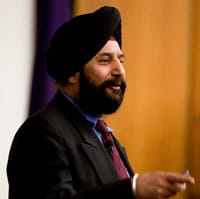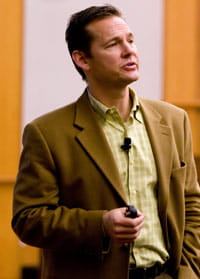Prestigious experts explore digital innovation from multiple industry perspectives
2/22/2008 -
| |
 |
Related Video |
|
| |
| |
|
| “A great brand has to have an eternal and outrageous promise,” said Jeff Bell, the corporate vice president of Microsoft’s interactive entertainment business. In Bell’s industry, for example, it’s not enough to promise a particular kind of fun. A better strategy, he said, would be to reinvent fun itself.
With Bell’s keynote address, “The New Definition of Fun,” the 2008
Kellogg Technology Conference was underway. The student-led Feb. 20 event brought students, faculty, staff, alumni and distinguished guests of the Kellogg community to the James L. Allen Center to discuss this year’s theme: The Next Wave of Technology Innovation.
Bell’s remarks covered topics including the changing profile of the average video gamer (no longer exclusively teenage, white and male) and the shifting role of “interactive entertainment” in the home (a social activity among friends and families). “We used to pull out a board game. We used to play after dinner. Some of that’s been lost. We want to bring it back,” said Bell.
The conference featured three keynote speakers and four panel discussions, one each on “Social Marketing,” “New Media,” “Mobile Advertising and Retail” and “Venture Financing.” Several Kellogg School alumni — including Jim Eadie ’05, senior director of MTV’s digital distribution business — lent their insights to discussions throughout the day.
 |
| Satjiv Chahil, Hewlett-Packard's senior vice president of global marketing, delivered a keynote address at the Feb. 20 conference. |
| Photo © Nathan Mandell |
 |
| Morning keynote speaker Jeff Bell, corporate vice president of Microsoft's interactive entertainment business, told 2008 Technology Conference attendees how his team plans to "redefine fun." |
| Photo © Nathan Mandell |
Participants in the “Social Marketing” panel explored brand management in the age of the Internet-based social and professional network. Panelist Mike Gamson, general manager of new business for LinkedIn, was optimistic: “The value we will derive from this is really all in front of us,” he said.
Ross Mayfield — chairman, president and co-founder of Socialtext — noted that the way to a networked consumer’s heart is through her peers. Whether in the market for a car or a presidential candidate, he said, consumers are far more likely to trust their peers than to trust institutions. “If you have a problem with your Dell computer, are you going to call the call center? No. You’re going to tap that one guy you know who’s sort of good with computers.”
The conference’s second keynote speaker, Satjiv Chahil, is working to change the perception of computers — at the least the ones produced by Hewlett-Packard Co., where he is the senior vice president of global marketing — as cold, impenetrable machines.
Chahil walked conference attendees through HP’s recent re-branding effort (“Making the computer personal again”) and said a great marketing campaign does more than win customers: It also inspires the workforce.
“Provide a raison d’être for your company that everybody believes in,” he said.
A key component that made the HP campaign successful, said Chahil, was its featuring of high-profile HP users in television spots. With users as distinct as rapper Jay-Z and Microsoft founder Bill Gates writing their own monologues and choosing their own wardrobes, Chahil said the spots caught on with a diverse audience.
Following Chahil’s address and the afternoon panel sessions was the conference’s final keynote: Mozilla Organization founding member and “chief evangelist” Mike Shaver. As a private nonprofit organization established “for the public good,” Mozilla is tricky for some investors (and tax experts) to pin down. “We’re a project and we’re a manifesto,” said Shaver, adding that the organization is also a community, a foundation and an “ecosystem of products.”
Shaver’s presentation focused on the open-source software developer’s most popular product, the Internet browser Firefox.
“Firefox is what I like to call a seven-year overnight success,” said Shaver. Though conceived in part to give the software establishment a run for its money, Shaver said Firefox developers are motivated by much more than a desire to out-perform Internet Explorer.
“A ‘them’ to our ‘us’ is an incredibly effective way to inspire passion,” said Shaver, but it’s not easy for any organization to make positive changes if its members define themselves solely by what they are not. “We’re not about switching people to a new monopoly,” he said. “We want people to be able to choose not to use Firefox.”
But before people can start choosing, Shaver said, one challenge for Mozilla will be to let its potential customers know there is a choice to be made. “People don’t think about changing their file manager or changing the way their microwave works.”
According to Shaver, another big challenge will be keeping up with the global proliferation of the Web.
“We want to figure out how we can be a better browser for all the people who are going to join the Internet,” he said, referring to the estimated 2 billion people in Asia expected to plug in within the next decade. Though dedicated users around the world have already translated the software into more than 30 languages, he added, there is still much work ahead.
Students who helped design and deliver the conference, one of the most prestigious of its kind and which marked its 14th year, expressed satisfaction with the daylong event that brought together practitioners and academics.
"The panels and keynote speakers were extremely well received, and we received compliments from several of the conference attendees,” said Ajit Ramachandran ’08, the conference’s general manager, after the event. “Our theme of technology innovation resonated with the audience, particularly in that we were able to approach it from multiple industry perspectives. We had record attendance from the very first keynote session through the end of the day.”






